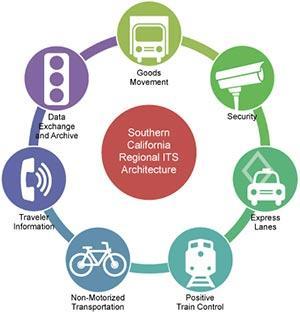Intelligent Transportation Systems
In Southern California, there are several Intelligent Transportation Systems (ITS) architectures that may be applicable to an ITS project. SCAG has developed a Southern California Regional ITS Architecture that addresses multi-county issues: those projects, programs, and services that require connectivity across county boundaries or are deployed at a multi-county level. Secondly, each County has developed a Regional ITS Architecture to provide a framework for local deployment of ITS applications. A third “layer” is also in place at the state level: the California ITS Architecture and System Plan addresses those services that are rolled out or managed at a state level or are interregional in nature.
SCAG’s Southern California Regional ITS Architecture provides a framework for ITS planning that promotes interoperability and communication across jurisdictional boundaries. Projects developed under a regional framework extend the usefulness of any single project by making information easily accessible for operators and users of the system. The Southern California Regional ITS Architecture is intended to provide a resource for project sponsors and transportation providers that coordinates cross-county planning efforts in the SCAG region and facilitates project development (planning, design, implementation, etc.).
Regional ITS projects, or transportation projects (both highway and transit) with ITS elements, that want to be eligible for Federal transportation funding are required to be consistent with the Southern California Regional ITS Architecture pursuant to 23 CFR 940.9 and 940.11. In addition, such projects must comply with system engineering requirements and applicable Federal standards that have been adopted for the implementation of ITS.

California State Budget Reduces Barriers to Housing Production and Extends Deadline for Regional Early Action Planning (REAP 2.0) Program
Earlier this week, the governor signed the 2025-2026 state budget, which includes a suite of reforms to reduce barriers to housing production.

Connect SoCal 2024 Implementation Update: Sustainable Communities Strategy Accepted
On May 7, the California Air Resources Board (CARB) informed SCAG that it had accepted SCAG’s determination that the Connect SoCal 2024 Regional Transportation Plan/Sustainable Communities Strategy (RTP/SCS) meets CARB’s greenhouse gas (GHG) emission reduction targets.

General Assembly Elects 2025-26 Board Officers
The General Assembly voted to approve the nominations for the SCAG 2025-26 Regional Council officers as recommended by the Regional Council: Hon. Cindy Allen (City of Long Beach) will serve as 2025-26 Regional Council president; Hon. Ray Marquez (City of Chino Hills) will serve as Regional Council first vice president; and Hon. Jenny Crosswhite (City of Santa Paula) will serve as Regional Council second vice president. Leadership also recognized Hon.

Surface Transportation Block Grant and Congestion Mitigation and Air Quality Improvement Program Call for Project Nominations Now Open
The federal fiscal year 2026-27 and federal fiscal year 2027-28 Surface Transportation Block Grant program (STBG) and Congestion Mitigation and Air Quality Improvement program (CMAQ) SCAG online application opened for all eligible applicants on March 31. This application will be available through May 16 at 5 p.m.

Surface Transportation Block Grant and Congestion Mitigation and Air Quality Improvement Program Guidelines Now Available
On March 6, the SCAG Regional Council approved the federal fiscal year 2026-27 and federal fiscal year 2027-28 Surface Transportation Block Grant program (STBG) and Congestion Mitigation and Air Quality Improvement program (CMAQ) Program Guidelines.



